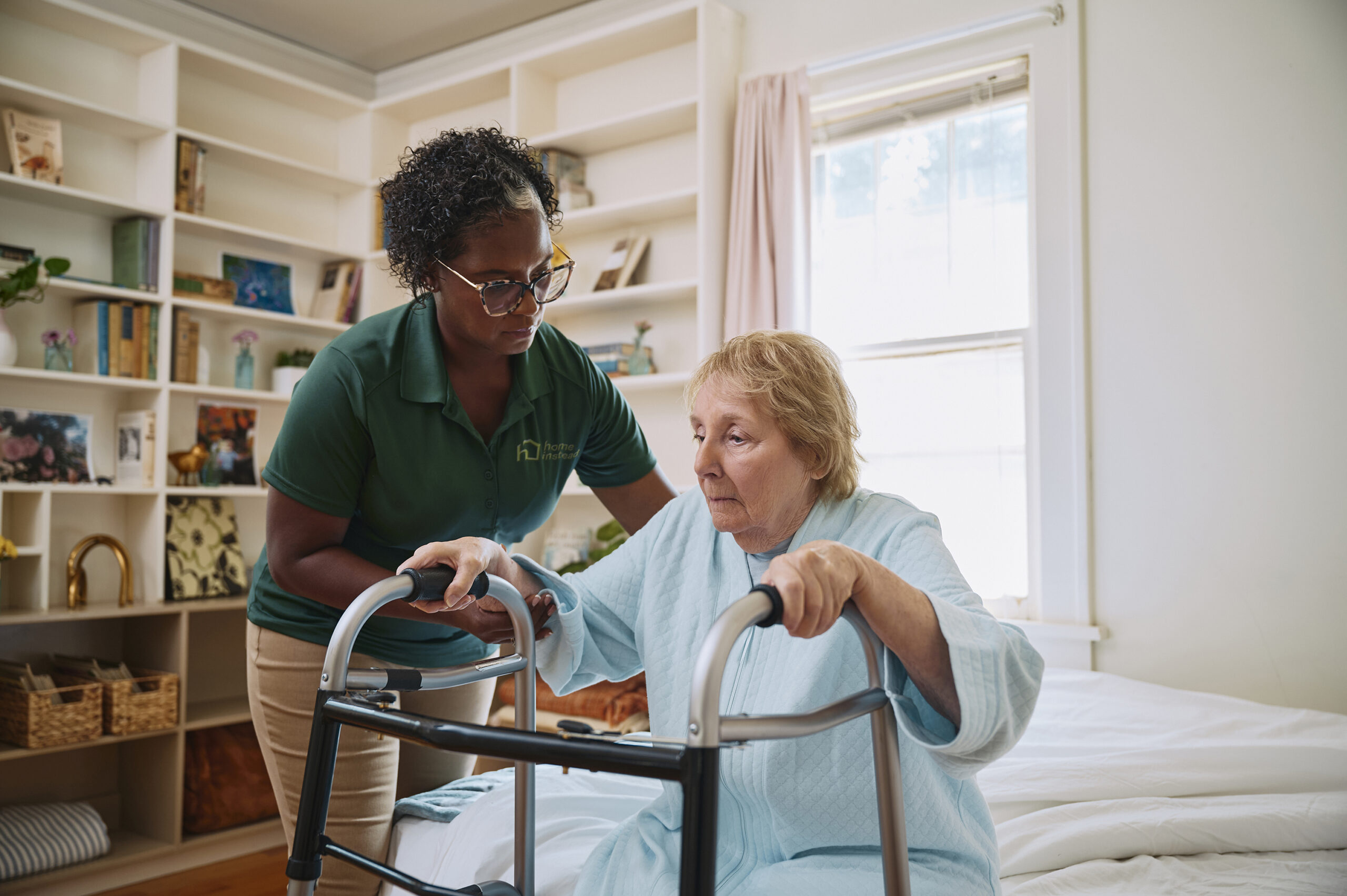Sometimes the signs are subtle—a missed medication, an unkempt home. Learn how to recognize when it’s time to step in and how home care can offer the right support at the right time.
As our loved ones age, changes can happen gradually — so subtly that they’re easy to miss. It’s not always clear when additional support is needed, and many families struggle to know when to step in. But recognizing the early signs that your parent or loved one may benefit from in-home senior care is critical for their safety, dignity, and overall well-being.
In this guide, we’ll help you identify the gentle, yet telling, signs that it may be time for home care—and how to approach the decision with compassion and confidence.
Why Recognizing the Right Time Matters
Waiting too long to introduce care can lead to accidents, worsening health conditions, and emotional strain for both the senior and their family. On the flip side, initiating home care early can prevent hospitalizations, extend independence, and dramatically improve quality of life.
Home care services—ranging from help with daily tasks to skilled nursing—allow aging adults to remain in the comfort of their own homes while getting the support they need.
1. Increasing Forgetfulness or Cognitive Decline
Mild forgetfulness is normal with age. But frequent memory lapses, confusion, or getting lost in familiar places may indicate early signs of dementia or Alzheimer’s.
Red flags include:
Missed appointments or medications
Repeating stories or questions often
Difficulty managing bills or finances
Wandering or becoming disoriented
Home care can help: A professional caregiver provides gentle reminders for medications, helps manage routines, and offers companionship that eases cognitive stress.
2. Declining Personal Hygiene
Has your loved one stopped bathing regularly or begun wearing the same clothes for days? Poor grooming isn’t always a sign of apathy—it might signal physical difficulty, fear of slipping in the shower, or even depression.
Watch for:
Body odor or bad breath
Dirty or mismatched clothing
Long nails or unwashed hair
A caregiver’s role: Home care professionals assist with bathing, dressing, grooming, and toileting while preserving dignity and privacy.
3. Sudden Weight Loss or Poor Nutrition
A sharp drop in weight can be a sign of underlying medical issues or difficulty with cooking and eating. Some seniors may lack the energy, motivation, or ability to shop for groceries and prepare meals.
Warning signs:
Spoiled food in the fridge
Empty pantry or expired items
Forgetting to eat meals
Difficulty using the stove or microwave
How home care helps: Caregivers can prepare balanced meals, ensure proper hydration, and provide mealtime companionship to reduce isolation.
4. Mobility Issues or Frequent Falls
Unexplained bruises or hesitance to walk may indicate your loved one is having difficulty getting around safely. Falls are the leading cause of injury among seniors—and many occur at home.
Things to notice:
Difficulty getting up from a chair or bed
Holding onto walls or furniture for balance
Refusal to leave the house
What a caregiver provides: Home care includes mobility assistance, fall prevention strategies, and light housekeeping to keep pathways clear and safe.
5. Withdrawal from Social Activities
Is your parent less interested in hobbies, phone calls, or visits with friends? Social withdrawal can stem from physical limitations, depression, or embarrassment about memory lapses.
Possible signs:
No longer attending church or clubs
Ignoring phone calls
Refusing visitors or outings
Loneliness and irritability
Why home care matters: Caregivers offer meaningful companionship, conversation, and help seniors stay engaged with their community.
6. Decline in Household Cleanliness
A once-tidy home now looks cluttered, dusty, or even unsafe. If your loved one is struggling to maintain their living space, it could point to physical limitations or mental fatigue.
Indicators:
Unwashed dishes, laundry piling up
Unemptied trash
Mail stacking up unopened
Pet neglect (if applicable)
Caregiver support includes: Light housekeeping, organizing spaces, and helping maintain a clean and peaceful environment.
7. Missed Medications or Medical Appointments
Many seniors take multiple medications daily. Forgetting or mismanaging them can be dangerous—especially for conditions like heart disease, diabetes, or high blood pressure.
Look for:
Pills scattered or missing
Confusion about dosages
Missed follow-ups with doctors
Poor management of chronic conditions
Home care can assist with: Medication reminders, transportation to appointments, and communication with healthcare providers.
8. Mood Changes or Signs of Depression
Sudden changes in mood, irritability, or disinterest in things they once enjoyed may be signs of emotional distress or cognitive changes. Depression in older adults often goes undiagnosed.
Emotional warning signs:
Frequent sadness or anxiety
Insomnia or oversleeping
Hopelessness or restlessness
Sudden anger or frustration
Why a caregiver helps: In-home caregivers offer companionship, routine, and emotional support—all of which contribute to better mental health.
9. Caregiver Burnout in Family Members
Sometimes the signs that it’s time for home care aren’t with the senior—they’re with you. If you or a family member is acting as a primary caregiver and feeling overwhelmed, it may be time to bring in professional help.
Signs of burnout:
Exhaustion or sleep disruption
Guilt or resentment
Declining work performance
Physical health issues
Home care is relief: Sharing caregiving responsibilities helps restore balance to your life and improves the quality of care your loved one receives.
10. Gut Feeling That Something’s Not Right
Sometimes the clearest sign is your own intuition. If you’ve been feeling uneasy after visits, noticing subtle changes, or worrying constantly about their safety, trust your instincts.
Ask yourself:
Do I worry when they’re alone?
Are they struggling more than they admit?
Would a few hours of help each day improve their life?
A home care consultation can help assess needs and determine if care is appropriate now—or in the near future.
Common Misconceptions About Home Care
Many families delay home care because of fear, stigma, or misunderstanding. Let’s clear a few things up:
“They’re not ready yet.” You don’t need to wait for a crisis. Home care can start with just a few hours a week.
“They’ll lose independence.” Home care helps seniors stay independent by offering the right support at the right time.
“It’s too expensive.” Many home care services are flexible and affordable—often more so than assisted living. Long-term care insurance or VA benefits may also help cover costs.
“They’ll never accept help.” With the right caregiver and a gentle introduction, most seniors adapt well and even enjoy the companionship.
How to Talk to Your Loved One About Home Care
Bringing up the topic of home care can be emotional. Here’s how to approach it with compassion and care:
Choose the right moment: Don’t spring the conversation in a moment of stress or crisis.
Express concern, not judgment: Use “I” statements: “I’ve noticed you’ve seemed tired lately…”
Listen actively: Validate their feelings and concerns.
Focus on benefits: Emphasize how care will support—not take away—their independence.
Suggest a trial: Propose starting with just a few hours a week to “see how it goes.”
Getting Started: What Home Care Can Look Like
Home care services are highly customizable and can include:
Personal care: Bathing, dressing, grooming
Companionship: Conversation, hobbies, emotional support
Meal preparation: Cooking, grocery shopping, nutrition planning
Light housekeeping: Laundry, dishes, vacuuming
Transportation: Doctor appointments, errands
Medication reminders: Staying on schedule safely
Specialized care: Dementia support, mobility assistance, hospice support
You can start small and adjust as needs evolve.
Final Thoughts: When In Doubt, Ask for Help
Recognizing the signs early—and acting on them—can help your loved one age safely, comfortably, and with dignity in their own home. If you’re unsure whether now is the time for home care, schedule a professional assessment. It’s the first step toward peace of mind for your whole family.
If you’re seeing these signs in someone you love, don’t wait. Contact Home Instead today for a free home care consultation. We’ll work with you to create a personalized care plan that meets your loved one’s needs—and gives you the peace of mind you deserve.



